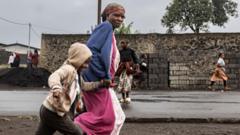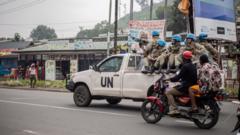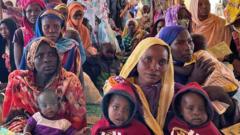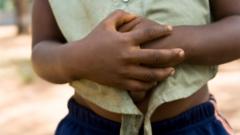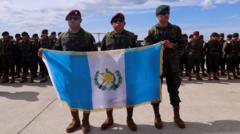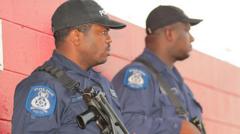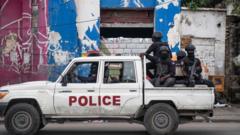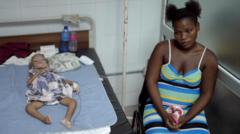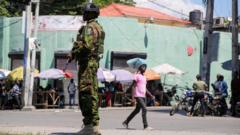As Haiti faces a humanitarian catastrophe fueled by gang violence, families are caught in the crossfire, desperately seeking help and safety in a country where the state has collapsed.**
A Witness to Despair: The Plight of Families Amidst Haiti's Gang Crisis**
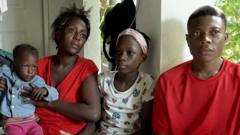
A Witness to Despair: The Plight of Families Amidst Haiti's Gang Crisis**
Amid escalating gang violence, mothers like Venda fight for their children's survival, while Kenyan forces strive to restore order.**
On a harrowing journey through Haiti's Port-au-Prince, the chilling consequences of gang violence are laid bare, particularly for vulnerable families. Amidst the chaos, two-year-old Shaina lies in a hospital bed, connected to an intravenous drip. Her mother, Venda, remains hopeful that medical assistance can alleviate the malnutrition ravaging her daughter. Shaina's plight is just one of many, as 760,000 children teeter on the brink of famine in a nation recently engulfed by violence and despair.
Dreadful statistics underscore the dire state of the capital—an estimated 85% now under gang control since the assassination of former president Jovenel Moïse in 2021. The rampant violence continues unrestrained with the UN reporting over 5,000 deaths this year alone. Even hospitals, where most citizens seek refuge, are not immune to the terror; police firefights erupt within their walls, leaving terrified patients praying for safety.
Pierre, a nearby resident, recounted the harrowing moment he was struck by a bullet while caught between rival gangs. "If the government provided better stability and youth programs, perhaps fewer would succumb to gang life," he reflects, underscoring the urgency of addressing the root causes of the crisis.
In response to the escalating violence, the UN has deployed a Multinational Security Support Mission (MSS), led by Kenyan forces who arrived in June 2023. Although their presence promises a semblance of stability, they are woefully outnumbered, contending with 12,000 armed gang members. Just one day during their patrol, the crew encountered hostile gunfire, starkly highlighting the perils that accompany their efforts to reclaim the streets.
Gang brutality extends beyond firefights—horrific sights litter Port-au-Prince, including human bodies burned in the streets as grim warnings from rival factions. The Kenyan officers report exhaustion and the need for reinforcements, yet the path forward remains routed in danger.
Commander Godfrey Otunge, who leads the Kenyan contingent, reports calls for increased support, indicating a desperate need to reclaim areas stricken by gang dominance. However, their foothold is shaky, with bitter reminders of the over 100 gangs operating throughout the capital, where even young boys are drawn in—illustrating a rapidly deteriorating social fabric.
Recently displaced individuals, like Negociant, reflect the humanitarian toll the gangs have taken, demonstrating the chaos that leads mothers and children to seek shelter in schools, turned camps for those fleeing their homes. "I was living in my own house, but gangs took over my neighborhood," reveals a distraught Negociant, epitomizing the broader tragedy of a nation at the mercy of lawlessness.
In the heart of Haiti, the camaraderie of survival clashes brutally with the backdrop of violence, leaving countless families grappling with a deepening crisis. As international forces maintain a fragile presence, their effectiveness in restoring order hinges on both immediate support and long-term solutions to secure a future free from fear and instability for the Haitian people.
Dreadful statistics underscore the dire state of the capital—an estimated 85% now under gang control since the assassination of former president Jovenel Moïse in 2021. The rampant violence continues unrestrained with the UN reporting over 5,000 deaths this year alone. Even hospitals, where most citizens seek refuge, are not immune to the terror; police firefights erupt within their walls, leaving terrified patients praying for safety.
Pierre, a nearby resident, recounted the harrowing moment he was struck by a bullet while caught between rival gangs. "If the government provided better stability and youth programs, perhaps fewer would succumb to gang life," he reflects, underscoring the urgency of addressing the root causes of the crisis.
In response to the escalating violence, the UN has deployed a Multinational Security Support Mission (MSS), led by Kenyan forces who arrived in June 2023. Although their presence promises a semblance of stability, they are woefully outnumbered, contending with 12,000 armed gang members. Just one day during their patrol, the crew encountered hostile gunfire, starkly highlighting the perils that accompany their efforts to reclaim the streets.
Gang brutality extends beyond firefights—horrific sights litter Port-au-Prince, including human bodies burned in the streets as grim warnings from rival factions. The Kenyan officers report exhaustion and the need for reinforcements, yet the path forward remains routed in danger.
Commander Godfrey Otunge, who leads the Kenyan contingent, reports calls for increased support, indicating a desperate need to reclaim areas stricken by gang dominance. However, their foothold is shaky, with bitter reminders of the over 100 gangs operating throughout the capital, where even young boys are drawn in—illustrating a rapidly deteriorating social fabric.
Recently displaced individuals, like Negociant, reflect the humanitarian toll the gangs have taken, demonstrating the chaos that leads mothers and children to seek shelter in schools, turned camps for those fleeing their homes. "I was living in my own house, but gangs took over my neighborhood," reveals a distraught Negociant, epitomizing the broader tragedy of a nation at the mercy of lawlessness.
In the heart of Haiti, the camaraderie of survival clashes brutally with the backdrop of violence, leaving countless families grappling with a deepening crisis. As international forces maintain a fragile presence, their effectiveness in restoring order hinges on both immediate support and long-term solutions to secure a future free from fear and instability for the Haitian people.

